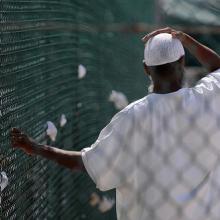hunger strike
Hunger strikes allow detained immigrants to regain their agency while simultaneously throwing themselves on the mercy of the very institution that has oppressed them.

Jesse Hall, University of Missouri, Columbia. Adapated image via Adam Procter/Flickr
We have witnessed a remarkable series of events on the Columbia, Mo., campus of the University of Missouri this week. The university president and the chancellor of the Columbia campus resigned Nov. 9 in response to protests claiming that university leadership had failed to appropriately address and respond to a toxic racial climate on campus.
The recent racist incidents, which many students and faculty felt the administration had failed to confront, reveal a stunning lack of empathy for students of color at the university. They include: racial slurs hurled at a black student body president and a black student organization, and a swastika painted in human feces on the wall of a residence hall.
But these specific incidents merely allowed a long-simmering stew of disrespect, verbal attacks, and marginalization of students of color to come boiling to the surface.
The Columbia campus of the University of Missouri is only a two-hour drive from Ferguson, Mo. When Michael Brown was shot in August 2014, protesters took to the streets of Ferguson every night, and student activists from Mizzou were among them. They saw what standing up to entrenched institutional racism looked like, and they saw that victories could be won with non-violent protest.

Image via JoeyPhoto/Shutterstock
“Several of the now 15 Dyett hunger strikers returned to City Hall Monday on their 29th day without solid food to call on Mayor Rahm Emanuel to at least have a ‘respectful conversation’ with them over the future of the Bronzeville school in Washington Park.
‘A compromise happens when two people come together and they work out together something that's agreeable to both parties,’ said Jitu Brown, a leader of the hunger strike, Monday at City Hall. ‘There was no compromise.’
According to Brown, he was told about the CPS plan 15 minutes before it was presented by Chief Executive Officer Forrest Claypool. Brown said he asked to continue to negotiate, but Claypool responded, ‘We're moving forward.’
‘That's not compromise,’ Brown said.”

Image via Jinga/Shutterstock
Every year, U.S. authorities hold over 400,000 suspected immigration violators in 250 jails and detention centers across the nation . Anyone suspected of violating immigration law — including permanent U.S. residents, asylum seekers, pregnant women, victims of torture and children — are subject to mandatory detention without trial and are often held indefinitely for weeks, months, or even years. Ruiz’s story is a testament to the brokenness of the immigrant detention industry.
Although the U.S. government has the right to exercise authority over its borders, it also has legal and moral obligations to protect the human rights of immigrants. From a Christian ethics perspective, it is our obligation to welcome the stranger, provide sanctuary to our brothers and sisters in Christ, and work towards the liberation of all. Mandatory immigrant detention not only deprives people of their dignity — it is also illegal, ineffective, and inhumane.
1. Pope Francis Is Making Americans Uncomfortable — Why That’s a Good Thing
According to Gallup, Pope Francis’ favorability ratings have dropped from 76 percent in 2014 to 45 percent in 2015. America magazine writer Kerry Weber explains the pontiff’s recent dips in the U.S. polls.
2. Why Kylie Jenner Gets to Be ‘Just a Kid,’ But Amandla Stenberg Does Not
"America loves to defend those it perceives to be the most vulnerable — i.e. young white girls — at the expense of and detriment to young girls of color. … Though some may say this is just a pointless Instagram beef between children, this mentality of putting white womanhood on a pedestal has violent, real-world ramifications."
3. NASA Finds ‘Earth’s Bigger, Older Cousin’
Wait … what, now? According to NASA, its Kepler spacecraft has identified a planet some 1,400 light-years away — the first "nearly Earth-size planet to be found in a habitable zone of a start similar to our own," according to CNN.
What can be accomplished in just 10 days by the courageous actions of young immigrants? More than many of us would hope to accomplish in a year, or a lifetime. It has been more than a week since the nine DREAMers arrived at the U.S.-Mexico Nogales port of entry on July 22 and asked authorities to let them come back home. They were willing to risk all they have gained to fight for immigrant families that have been torn apart by the 1.7 million deportations by the Obama Administration.
In just over a week, these courageous young immigrant leaders have received widespread national attention. Tens of thousands of calls and letters from supporters and organizations around the country have called for their release, including the U.S. Jesuit Conference. Multiple protests and sit-ins by nationwide members of the National Immigrant Youth Alliance have included the parents and family members of the DREAM 9, gathering support from members of Congress. Just recently, Rep. Luis Gutierrez (D-Ill.) made a floor speech in the House and nearly 40 other house members have signed a letter to President Barack Obama urging him to take immediate action and use his discretion for their release.
PUBLIC PRESSURE IS finally building on President Obama to fulfill his promise to close the Guantanamo prison, which still houses 166 miserable leftovers from the Bush-Cheney “war on terror.” That pressure is well-placed. Gitmo has been a disaster from the beginning. Christians and other people of faith must join in calling for its closure.
Detainees were originally shipped to Gitmo in the vain hope of avoiding the reach of the U.S. judiciary. In this sense Gitmo was conceived in Constitution-evading sin. The Supreme Court rejected the evasion in 2006, but the damage was already done.
Some of the detainees brought to Gitmo were tortured. This has been confirmed by numerous sources, including a leaked 2006 Red Cross report and the 577-page report of a bipartisan blue-ribbon detainee panel organized by The Constitution Project, on which I served.
More than half of the remaining detainees have been cleared for release, but for domestic and geopolitical reasons they continue to be held. More than 100 of them are currently on a hunger strike, with dozens being force-fed, a practice that violates both American Medical Association and World Medical Association standards and which our Detainee Task Force condemned unequivocally.
Some detainees cannot be tried because the evidence against them was obtained by brutal or torturous means and is tainted or would be embarrassing to the U.S. Others are slated for trials in novel military commissions whose legal problems are so severe that they have not proceeded. Civilian trials on U.S. soil were blocked in 2009 by a fearful, recalcitrant Congress. So 166 men are held in limbo indefinitely, without trial and without foreseeable prospect of release. This is unconstitutional and a violation of the most basic legal and human rights.
CLAREMONT, Calif. — Last Sunday, Timothy Murphy began a fast of solidarity with the Guantanamo inmates who are on a hunger strike to protest their indefinite detention. As one of our Ph.D. students and an ordained minister in the Christian Church (Disciples of Christ), Timothy felt spiritually called to the hunger strike. He is drinking water and nothing else.
Timothy intends to continue as long as he is able, or until the Obama administration begins taking action to address the prisoners’ legitimate grievances, including deliberate steps to find homes for the 86 prisoners who have been cleared for release. Timothy says he would be happy to stop the fast tomorrow if the administration indicated that it was taking steps to do this.
I, like Timothy, believe this is a basic human rights issue for the prisoners. I also believe that it is critical for the health of our nation’s collective soul and integrity to get it resolved. Timothy’s deep commitment inspired me, so I decided to join him, but in a more limited fast: I am fasting three days this week, and every Thursday hereafter, until steps are taken to resolve the Guantanamo issues.
President Obama broke his silence to comment on the current hunger strike of over 90 men at Guantanamo Bay. Time reports:
“It’s not sustainable,” President Obama said Tuesday, breaking his silence about the protest against his own government. “I mean, the notion that we’re going to continue to keep over 100 individuals in a no-man’s land in perpetuity.”
Obama repeated a position he has long held: The detention facility needs to be closed, with the prisoners either transferred to third countries if they do not present a threat or to the United States for adjudication. “This is a lingering, you know, problem that is not going to get better,” he said. “It’s going to get worse. It’s going to fester.”
The next steps at Guantanamo Bay are muddled in beaucracy. The President, Congress, and Secretary of Defense all have steps they must take before any real progress can be made.
Read more here.
In today’s White House press conference, CBS News' Bill Plante raised the questions with President Barack Obama about the growing hunger strike among prisoners at Guantanamo Bay. “Is it any surprise, really,” asked Plante, “that they would prefer death rather than have no end in sight to their confinement?"
"Well, it is not a surprise to me, “ President Obama responded, “that we've got problems in Guantanamo.”
Last week, a military spokesperson confirmed that the total number of irregularly held prisoners at the U.S. Naval prison at Guantanamo Bay has risen to 92 out of the 166 still in detention.
The Guantanamo prisoners began hunger striking on Feb. 6 after guards confiscated their Korans to examine them for contraband. The prisoners reported that their Korans had been desecrated by the guards, which a military spokesperson denies. Fueling the strike is the men’s loss of hope of ever leaving Guantanamo alive, most having been held more than 11 years without charge and Obama refusing to free even the 86 cleared for release.
 Here's a little round up of links from around the Web you may have missed this week:
Here's a little round up of links from around the Web you may have missed this week:
- Our prayers extend to the people of Norway. Lord, have mercy.
- Why voter ID laws will disenfranchise women. (HT: Kristof)
- The New York Times said it best. Today's weather "felt more like being licked by a big, swampy monster."
- Who wrote what? Rep. West vs. Jane Austen.
- These awesome folks turned Carmageddon into a dinner party.

This comes after a Supreme Court decision in May that ordered California to reduce its prison population, as overcrowding was causing "needless suffering and death."
Part of what's making the standoff worse is the belief that the strike is, in essence, a form of gang activity. For one thing, as Colin Dayan noted in passing in a New York Times op-ed, "How they have managed to communicate with each other is anyone's guess." The California Department of Corrections and Rehabilitation (CDCR), though, isn't so stumped.
My alarm went off at 5 a.m. today. As I sat up and unzipped my sleeping bag, a gust of Oklahoma wind bitterly ushered me into a new day. Drops of rain splashed my face, extinguishing the last few embers of my sleepiness.




